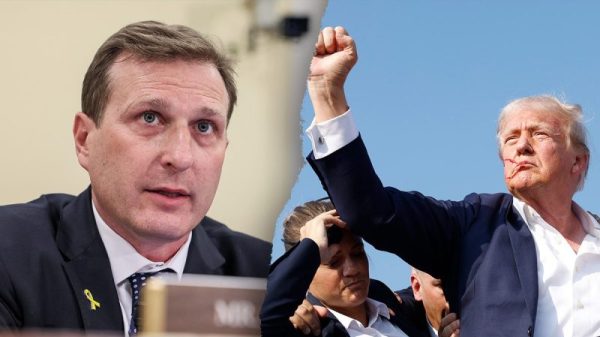Virginia Gov. Glenn Youngkin (R) is not a candidate for the 2024 Republican presidential nomination, but he has been assiduous about remaining in the vicinity of the discussion. Over the course of the past year or so, he’s done things aimed at keeping his name in the national conversation without actually jumping into the race, an approach that people like Florida Gov. Ron DeSantis (R) might now eye with envy.
But this approach also risks Youngkin getting out over his skis, engaging in national issues that might backfire on him. As did his decision in May to deploy Virginia National Guard troops to the U.S.-Mexico border, a decision predicated largely on fentanyl abuse in Virginia but which was almost certainly not going to result in any significant success.
Youngkin’s May 31 directive was obviously meant to some degree to give him a record on border issues despite his state’s primary immigration point being Dulles International Airport. It was predicated on “the humanitarian crisis of individuals unlawfully entering the United States” and “the associated human trafficking plight” — but largely centered on the most salient local issue.
“[I]llegal drugs are transported into our Commonwealth, leading to the tragic deaths and overdoses of thousands of Virginians,” the directive states. “The influx of fentanyl alone presents a severe threat to the Commonwealth, costing the lives of five Virginians each day on average.”
Because Texas was seeking support and because of “the unmitigated danger posed by the increasing drug supply exacerbating the fentanyl crisis and the impact of criminal activity in the Commonwealth,” Youngkin’s directive concluded, he was deploying the National Guard.
That mission has ended. The local NBC station in Washington, WRC-TV, obtained records of the deployment and found that Virginia’s detachment encountered no fentanyl smugglers at all. Instead, the soldiers were mostly engaged in identifying people crossing the border between immigration checkpoints and referring them to the Border Patrol.
This was entirely predictable. Since fentanyl began to surge into the United States in 2020, most of what has been seized was stopped at existing immigration checkpoints, not on the person of people crossing at other points along the border. Analysis from NPR published in August estimated that nearly 90 percent of what’s seized is seized at checkpoints.
There’s an obvious reason: Fentanyl pills are small and easy to conceal. It is far easier and faster to pay someone — often a U.S. citizen — to hide the drugs in their car and then drive through a checkpoint than to smuggle a more limited quantity on foot.
Smuggling operations are “looking for somebody we’re not going to pay a lot of attention to,” the director of one port of entry told NPR. “They target certain people and they offer money to drive through. I’ve been at this for over 36 years, and it’s been like that forever.”
The people the National Guard members were encountering were immigrants simply trying to get into the country — and usually looking for authorities on the U.S. side.
“Today, the majority of migrants crossing the border between ports of entry turn themselves in to Border Patrol agents intending to seek asylum,” Aaron Reichlin-Melnick, policy director of the American Immigration Council, told The Washington Post over email. “Over the last decade, as more humanitarian migrants have come to the border and asked to begin the asylum process, the percentage of migrants seeking to evade arrest has fallen significantly.”
This is a central driver of the strain on the federal system. Immigrants understand that claims of asylum often afford them the legal right to remain in the country for a period and that adjudicating those claims can take years. Making an asylum claim requires being in the United States, though, so many immigrants cross the border and then look for a law enforcement officer to begin the asylum process.
They aren’t always successful, of course. Reichlin-Melnick notes that some immigrants are deported soon after their arrival after failing to demonstrate that they have a “credible fear” of returning to their countries of origin.
“When happens when a migrant turns themselves in to Border Patrol varies dramatically depending on factors largely outside the migrant’s control,” he explained, “including their nationality, where they crossed, how many other people crossed with them, and whether they are accompanied by children.”
But again, this was predictable. It was predictable that deploying National Guard troops to regions of the border between checkpoints would result in a lot of people hoping to gain asylum and very few who were trying to bring in drugs like fentanyl. The WRC-TV analysis did find that nearly 200 people were referred by the National Guard members to law enforcement for potential criminal charges — though it’s “unclear whether any were charged with a crime.”
This is the central challenge of border politics. Fentanyl trafficking and the deaths that ensue is a severe problem in the United States but one that lacks obvious solutions. It’s rhetorically easy to portray illegal border crossings as a conduit for other illegal activity, like drug smuggling, but that rhetoric isn’t sustainable in practice.
Luckily for Youngkin, it’s a problem that is centered at the federal level. A problem, that is, for President Biden and whoever takes office on Jan. 20, 2025.





























